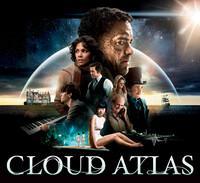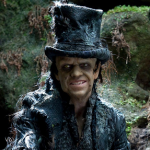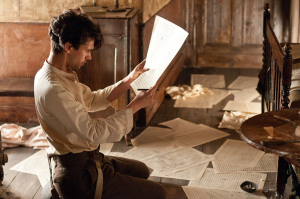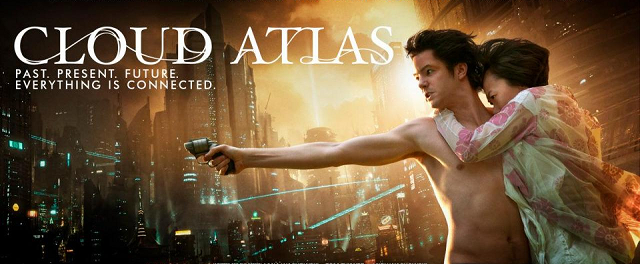CLOUD ATLAS sucks. No, wait…?
 So, I like movies that are different, movies that are out there. I like drama-action-romance-suspense-mystery-medieval-colonial-modern-futuristic-sci-fi, and more. Heck, I like them all (except for musicals, musicals suck).
So, I like movies that are different, movies that are out there. I like drama-action-romance-suspense-mystery-medieval-colonial-modern-futuristic-sci-fi, and more. Heck, I like them all (except for musicals, musicals suck).
Cloud Atlas gave us a premise that spanned several different stories over the course of several different centuries, and to that I said, “BRING IT, BABY.” The premise of Cloud Atlas looks cool, and it sounds cool… but does it end up being super cool, or just super cold?
In a nutshell…
Cloud Atlas is based off of a novel by David Mitchell. We are told six different stories, set in six different time periods. It all has to do with oppression of people and cultures, and implies that people and events are linked through time.
– Spoilers follow. Actually, I recommend reading the spoilers – it makes the movie better).
- South Pacific Ocean, 1849: Lawyer Adam Ewing saves a slave, is then saved by that slave, then decides to give up his life of law to join the Abolition Movement with his wife. Ewing writes a journal detailing his revelations.
- England and Scotland, 1936: Young musician Robert Frobisher begins composing his masterpiece, “The Cloud Atlas Sextet,” but a famous composer tries to take dual ownership of the music. Frobisher (after having read some of Ewing’s journals) gains enough confidence to stand his ground, and then finishes it on his own. He eventually writes a bunch of love letters to his boyfriend (Rufus Sixsmith).
- San Francisco, 1973: Journalist Luisa Rey meets an older Sixsmith, now a nuclear physicist. She does some investigating, almost gets murdered, then uncovers a plot to use a nuclear accident that will benefit big oil companies. Also, Rey finds Frobisher’s lover letters to Sixsmith, and (for some reason) tracks down a recording of his music, “The Cloud Atlas Sextet.”
- United Kingdom, 2012: Timothy Cavendish, a 65-year-old publisher, gets strong-armed for money. When he asks his brother for help, his brother tricks him into an old-folks home, the likes of which he can’t seem to escape. When he finally does escape, Cavendish writes a screenplay about his life, after reading about journalist Rey’s life.
- Neo Seoul (Korea?), 2144: Sonmi-451 is a genetically-engineered human clone created to be a slave worker (actually, there’s a small race of these “fabricants”). After coming into contact with ideas from Cavendish’s adventures, Sonmi-451 is instilled with ideas of rebellion and liberation. She eventually makes a public broadcast of her story (including words against exploitation), and is then executed.
- The Big Island, 106 winters after the fall (2321): Primitive Zachry and his tribe get a visit from Meronym, a member of an advanced society still holding on to the last remnants of technology. She needs his help to find “Cloud Atlas,” a remote communication station. With it, she can call Earth’s colonies to come back and help the few remaining humans on Earth. Zachry then finds out that his revered goddess, Sonmi, is actually Sonmi-451, a dead human clone.
One thing that I really did like is how the film depicts these six time periods. I never once disbelieved in what I was seeing because of the sets. Of course, Tom Tykwer and The Wachowskis were at the helm of this colossal movie, so I knew it would look good. Simply put, verisimilitude was never compromised (there, I’ve finally been able to use ‘verisimilitude’ in an actual print sentence).
So, visually, the movie scores high marks. And that’s really the only thing that I have good to say about it.
Let’s begin…
First of all, when the same actors portray different characters from different time periods, you wonder how their specific connections will be revealed in all their awesomeness. Well, the characters spanning the Cloud Atlas time periods weren’t connected, and having them played by the same actors was just damn distracting. It wasn’t symbolic or teamed with any meaning. And no, it wasn’t “artsy.” I guess on some level, one could argue that some characters may have been related, but (regardless) having them played by the same actors just didn’t work.
That was a gripe, and now we move on…
Movies that intertwine several stories is nothing new (Twenty Bucks, Love Actually, Four Rooms, etc.). However, where previous intertwining vignettes have something that actually intertwines them, Cloud Atlas really doesn’t. For example, in Twenty Bucks, we follow the stories that are told as they unfold around an object. In Love Actually, we follow the stories that are told through characters that are all linked via various relationships. And in Four Rooms, we follow the stories as they relate to a specific individual (one of my favorite movies, by the way).
 In Cloud Atlas, however, I watched most of the movie wondering if all of these stories were really linked at all. Sure, I could follow each of the individual stories just fine – there was nothing unusual or ground-breaking about them. It was trying to piece the entire thing together that got me stumped. At the two-hour mark, I wondered if this thing was ever going to coalesce. The six individual stories were interesting enough, but the movie (as a whole) was not.
In Cloud Atlas, however, I watched most of the movie wondering if all of these stories were really linked at all. Sure, I could follow each of the individual stories just fine – there was nothing unusual or ground-breaking about them. It was trying to piece the entire thing together that got me stumped. At the two-hour mark, I wondered if this thing was ever going to coalesce. The six individual stories were interesting enough, but the movie (as a whole) was not.
At the end of the film, the movie still didn’t really come together. I had to read up on the plot to fill in all of the holes. “Well, I knew that these two stories were tied together because of a manuscript that was mentioned in that one line of dialogue, but it turns out that that was it?!” That’s how it was with all of them. The stories were connected only by a few fragile threads, and I dare say that if you’re not paying attention, you’ll miss at least half of them (I was paying attention, but I guess some were just beyond me – or, I just couldn’t believe that what I was seeing was actually the connection).
Basically, this film is six short stories. That would not necessarily be a bad thing, if you wanted to present a film titled, “Six Short Stories, By David Mitchell.” I would have enjoyed this movie if it had been six short stories, one after another, including the minor connecting threads between them.
But each story is supposed to be a story that is read, observed, or realized by the main character in the next story at a pivotal moment. That’s apparently supposed to be a big deal, and we’re supposed to notice and revere it. At six integral moments in the film, we’re supposed to go, “Ohhhhhh… I get it, I see what you did there.” I just wasn’t awed by any of that. “Oh, ok, he read her manuscript… and so… he’s writing his own.” Really?! That’s the connection between Rey and Cavendish?
The real problem…
If the movie is trying to tell us that the past, present, and future are all connected by small events, well, I can be fine with that (regardless of how insipid those events actually are). What really makes this movie tedious to watch is that each story is cut up so many times in the film… jumping back and forth between all six over and over and over again. It was like trying to watch six different short films on six different TVs at the same time. At a time when I’m trying to figure out how all of these stories are connected, or if something dramatic is going to pull everything together, I don’t want to get vertigo from watching a massive collage of snippets.
 It would have been monumentally better to tell each story individually before moving on to the next. Or, if I’m especially mentally fit, to tell half of a story, then move on to the next story when the protagonist observes or reads about the last story, and so on.
It would have been monumentally better to tell each story individually before moving on to the next. Or, if I’m especially mentally fit, to tell half of a story, then move on to the next story when the protagonist observes or reads about the last story, and so on.
In this way, we would watch them in succession until their turning points, and then go back and finish in the same way. THAT would have been a much smoother thing to watch, instead of watching six stories get cut every 5 minutes onto the next. It was pure visual noise, and I just couldn’t settle down into the movie as it was presented. When (at the end of a very long movie) we quickly and finally see how each of the stories are connected (if we see those connections at all), our eyes should open wide and we should be saying, “ahhhh… brilliant.” But instead, we simply say, “uhhh, ok.”
And, as a kick in the side, by the end of the movie we realize that a very old and venerable Zachry is orating all six stories over a campfire. We see him this way at the very beginning of the film, and then again at the very end. The movie is a dramatization of his telling of these six connected stories, but I can’t imagine he’s telling it in the order that we see it. No, cutting up the scenes and placing them all over the place was for the “dramatic effect” for us moviegoers, not his campfire audience.
Final thoughts…
The overall story wants to make us think of the various oppressions of people and cultures. However, I found myself constantly waiting – either waiting for the story to really unfold with all of these characters, or waiting to simply start caring for the characters. In the end, there was simply no great emotional payoff – none at all.
Indeed, this movie is a great big train, but I wouldn’t call it a train-wreck, because it was never able to get up to speed. It’s a movie that ends up trying to be more than it is, but just never stacks up. It has aspirations, but never achieves them. In the end, Cloud Atlas was trying to be more than the sum of its parts. However, because of the lack of meaningful connections, and the chopped-up frequency in which the stories were presented, it ended up being less.
We all have our opinions, of course. Some will like Cloud Atlas, and some won’t. Some will understand and appreciate this movie from start to finish, and some will be completely bored to tears. And of course, still others will think they like it simply because they think they should.
I feel, though, that the most vocal of those who disagree with me will describe me as unenlightened, uneducated, close-minded, or just plain stupid (if they dare use such a word). And they will use words such as existentialism, dualism, anti-solopsism, and transcendentalism to make their point for the movie. Well, I don’t know what those big words really mean, and I shouldn’t have to in order to like a film. Any particular movie is not for everyone, but if you’re making one of the most expensive indie films (at a budget of $102 million), you should know that if it’s complicated, it’s probably going to struggle to earn that budget back (as this movie did).
It’s unfortunate for me that I didn’t read the plot synopsis or a review of the movie ahead of time. Perhaps then I would have actually enjoyed it. I prefer to start a movie afresh, without any expectations (as I believe a movie should be able to stand on its own), but this is a case where a little preparation will actually help. I really feel that reading up on this movie beforehand will actually help one to understand and appreciate it better. At this point, re-watching Cloud Atlas would improve my disposition, but at a long two hours and forty-three minutes, I’ll have to pass.
As a stand-alone movie, presented without any preamble or preparation, I did not enjoy it. Had I learned a bit about the actual premise and how it was presented, I probably would have. Although my experience was undeniably negative, if you plan on watching Cloud Atlas, I sincerely hope that this review helps you to enjoy it. After all, it’s definitely a movie that should be enjoyed – you’re just going to need a little help to get there.



It would be interesting to see if someone could put together a new version of the movie so that we watch it from start to finish, in chronological order. I wonder how it would fair then. Thanks for the review!
Thanks, Josh, for the comment.
I agree, I’d re-watch this thing if that were available.
Your complaint reminds me of a similar complaint I had about the film ‘Magnolia’. There is an intro that tells us the story of interconnected relationships, conicidences, and misunderstandings as a preamble right at the beginning. Then the main movie never lives up to the promise provided in those first 10 minutes.
I never saw Magnolia, and it sounds like I don’t want to. I did see Steel Magnolias, though. Does that count?
Reminds me of a movie we had to watch in our film class in 1994, starring Robin Williams called “Being Human”. That one was supposedly five connecting stories through time that didn’t make any sense whatsoever,nor was there any meaningful message. It sounds like the writer conned himself into a better budget a few years down the road.
I share like 99% of your opinion. My problems with the movie were very much the same, i was all the time trying to figure it out what was all the stories about, what was the theme. And when i realized about the song i could but feel it was silly and cheap.
Now, i do agree a movie can be challenging, but then i do expect the reward to meet the difficult, and it was not the case. In any case the art is making something great in a simplest possible way.
A movie can have intrigue, but it does have to give you information in a way you slowly enjoy the process of putting together the pieces. And it is not the case.
It is almost as the director/writer/producer (the famouse trinity of cinema) is thinking, it is gonna be confusing, and when everything fits in the end everybody gonna say wow!! But that doesn’t work for me, i want to enjoy all the movie, not the end, not suffer all the lack of talent to make a movie enjoyable. In anycase, that works for a short movie.
An example of doing such a thing right (even when it is not a coral movie) would be The sixth sense. Yes, the key to the story, the big turn is in the end, but you can enjoy the movie all along.